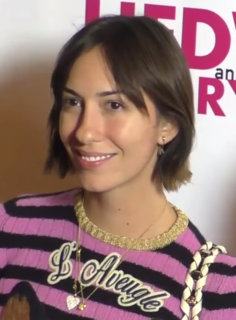A Quote by Francis Ford Coppola
When you make a film it is like asking yourself a question. When it is finished, you know the answer. Ultimately with all of cinema, we are just trying to learn about ourselves. I have always used the opportunity to make a film to learn more about myself, which I am still doing.
Related Quotes
For me, as a film goer, I like nothing more than to sit in the cinema, have the lights go down and not know what I'm about to see or unfold on-screen. Every time we go to make a film, we do everything we can to try to systematise things so we're able to make the film in private, so that when it's finished it's up to the audience to make of it what they will.
When I make a film, I never stop uncovering mysteries, making discoveries. When I'm writing, filming, editing, even doing promotional work, I discover new things about the film, about myself, and about others. That is what I'm subconsciously looking for when shooting a film: to glimpse the enigmas of life, even if I don't resolve them, but at least to uncover them. Cinema is curiosity in the most intense meaning of the word.
The one mistake you must never make is to agree to make a film or sign on to film that you don't believe in. Most importantly because it's unfair on that. It's not about you; it's just not fair on that project because you're doing it a profound disservice because you're not serving it - you're uncommitted, ultimately.
The Lean Startup isn't just about how to create a more successful entrepreneurial business, it's about what we can learn from those businesses to improve virtually everything we do. I imagine Lean Startup principles applied to government programs, to healthcare, and to solving the world's great problems. It's ultimately an answer to the question: How can we learn more quickly what works, and discard what doesn't?
I never intended to have a career as a journalist, writing about people who make movies. I did it as something that was really rewarding to do, given the opportunity to express myself about something I cared about, and also to learn a lot by watching filmmakers I admired. In a sense, it was my film school. After doing it for a few years, I decided that the time had come to get it together and do some work of my own. Even for a cheap movie, you need film stock and equipment and actors. Whereas to write, all you need is paper and an idea, so I felt that writing might be my stepping stone.
I really discovered [Dr.Strange] through hearing about this film and first meeting Scott [Derrickson] and getting into it and just opening up and saying, "Okay, this is, like all comics, very much of its era," and my first question was, 'How do you make this film? Why do you make this film now?' and the answers were so enticing that I was like, "I'm in."
When I make a film, I am hoping to reinvent the genre a little bit. I just do it my way. I make my own little Quentin versions of them... I consider myself a student of cinema. It's almost like I am going for my professorship in cinema, and the day I die is the day I graduate. It is a lifelong study.
Sometimes I am still surprised that I'm a model and that people think I'm good-looking. I've gone through a lot of different phases on what I do and why I do it - morally and ethically. I've tortured myself about it, especially in dealing with success and money. I just had to learn to look at it as a job, as opposed to identifying myself as a model and thinking of myself as a part of this industry. I just thought, Okay, this is an opportunity to learn and see and meet people. Still, I am a Scorpio and I'm quite competitive.
I'm not trying to be self-serving, but you know, you get to Hollywood, and if you want to make something big and loud and dumb, it's pretty easy. It's very hard to go down there and make a film like 'Sideways,' which I thought was a great film. They don't want to make films like that anymore, even though that film was very successful.
I don't come from a film background. I haven't learned anything about films or film-making. But I have a thirst to know everything about my profession. I want to learn about cinematography, about editing, about music recordings, about post-production. So when people in the know talk, I willingly listen.





































